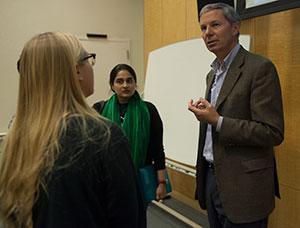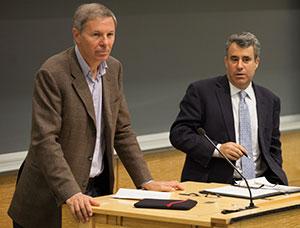Syria’s Conflict: Will the U.N. Intervene?
Columbia University Professor and Former Top Diplomat Jean-Marie Guéhenno assesses the chances of international involvement in Syria’s civil war
Syria’s Conflict: Will the U.N. Intervene?
Media Contact: Public Affairs, 212-854-2650 or [email protected]
New York, Oct. 12, 2012—Although Syria’s months-long internal conflict has spread across the border, drawing return fire from Turkey, don’t expect action from the United Nations any time soon, the director of Columbia University’s Center of International Conflict Resolution told students and faculty at an event sponsored by Columbia Law School’s Human Rights Institute.
“It is going to get much worse before there is any hope of negotiation,” said the director, Jean-Marie Guéhenno, who served as deputy joint special envoy to Syria for the United Nations and the Arab League between March and July 2012.
Guéhenno, a professor at Columbia’s School of International and Public Affairs, spent eight years as U.N. under-secretary-general for peacekeeping operations, overseeing the largest growth of peacekeeping in the history of the international body. His talk on Oct. 8 was part of the Human Rights Institute Speaker Series.
|
|
| Jean-Marie Guéhenno with audience members at his talk. |
The conflict in Syria, which has escalated into a civil war, began in April when the country’s President Bashar al-Assad took military action against a group of pro-democracy protesters. Tens of thousands have been killed, but diplomatic efforts to stop the violence have been unsuccessful.
U.N. Security Council members Russia and China have been criticized for routinely blocking resolutions recommending action on Syria. But Guéhenno said the other powers on the council also maintain “zero appetite for broader engagement” despite sharing concerns about the protracted violence.
Western powers also lack a clear solution or the will to become actively involved in the situation, he said, primarily because of uncertainty over who could replace al-Assad. Guéhenno noted that much remains unknown about the rebels, but the possibility of a militant Islamist regime taking power in Syria would have negative consequences on global security.
The future of Syria is tremendously important to the stability of the region because the country is the vehicle for a proxy war between the Gulf States and Iran.
“There is a really deep cold war that has settled between Iran and the Gulf monarchies in particular,” he said, adding that Saudi Arabia and the United Arab Emirates want to see pro-government forces in Syria suffer losses because of Iran’s support of Assad. “The Gulf countries think the more Iran bleeds in Syria, the better, even if that means chaos in Syria.”
Another dilemma facing the UN is how to deal with the Kurdish populations in Turkey, Syria, Iraq, and Iran, some of which seek to establish an independent Kurdish majority country. The Kurds on the Syria-Turkey border have used the chaos to assume greater autonomy, creating problems for Turkey.
“For many Kurds, this is their moment, but that’s a political atomic bomb for the whole region, and it’s ticking, but no one knows how to handle it,” Guéhenno said.
Before his talk, Guéhenno was introduced by visiting Columbia Law School Professor Sir Daniel Bethlehem, former principal legal adviser of the UK Foreign & Commonwealth Office.
|
|
| Guéhenno with Bethlehem |
Bethlehem, an expert on international law, is presiding over a number of events at the Human Rights Institute, Columbia Law School’s focal point of international legal human rights education, scholarship and practice.
# # #
Columbia Law School, founded in 1858, stands at the forefront of legal education and of the law in a global society. Columbia Law School combines traditional strengths in corporate law and financial regulation, international and comparative law, property, contracts, constitutional law, and administrative law with pioneering work in intellectual property, digital technology, tax law and policy, national security, sexuality and gender, and environmental law.

